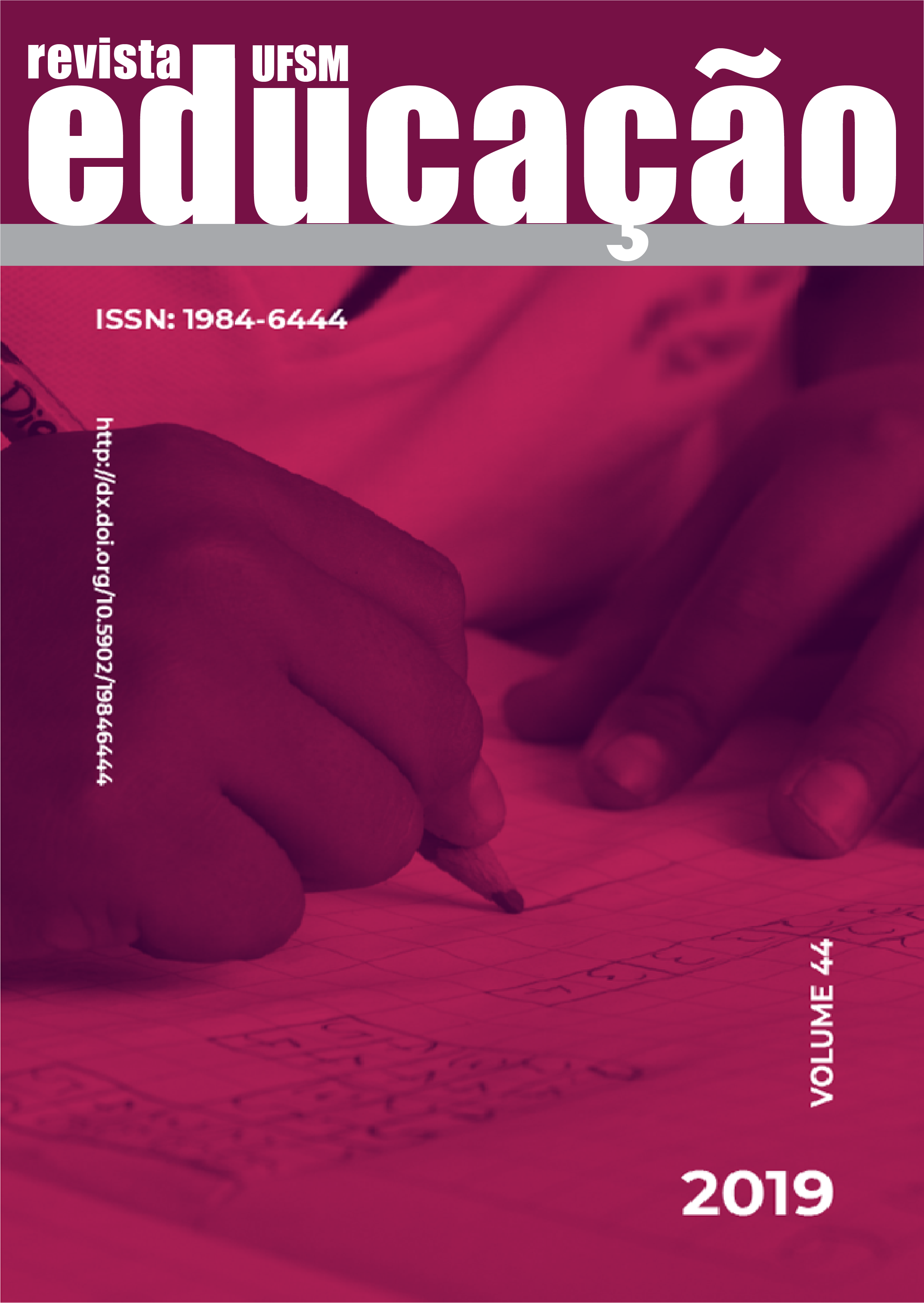Ethereal Technologies and Vocational Education: debating educational administration from the critical theory perspective
DOI:
https://doi.org/10.5902/1984644430629Keywords:
Vocational Education, Educational Administration, Critical Theory.Abstract
This essay debates the technological progress trends and their relation with education specially concerning the teachers´ training in the contemporary scenario. The main interest lays on the vocational and technological education and their potential social demands as well as the possible consequencies and impacts of the accelerated development and dissemination of ethereal and extracorporeal technologies on the social and particularly on the labour arena. Evolving from the theoretical and epistemological basis of the Philosophy of Technology and Jürgen Habermas works the essay provides an analytical frame designed to debate the teachers´ training considering the possibilities offered by some of the educational administration tools that may contribute to tackle today´s educational challenges. Organizational learning and communities of practice concepts are taken as fruitful approaches to improve teachers´ training.
References
ADORNO, Theodor Wiesengrund. Mínima moralia: reflexões a partir da vida danificada. São Paulo: Ática, 1993.
ADORNO, Theodor Wiesengrund. Educação e emancipação. São Paulo: Paz e Terra, 1995.
ASIMOV, Isaac. Eu, robô. São Paulo: Aleph, 2014.
BARRY, Max. Homem-máquina. São Paulo: Intrínseca, 2012.
BAUMAN, Zygmunt. Globalização: as consequências humanas. Rio de Janeiro: Zahar, 1999.
BAUMAN, Zygmunt. Modernidade líquida. Rio de Janeiro: Zahar, 2001.
BENJAMIN, Walter. Magia e técnica, arte e política: ensaio sobre literatura e história da cultura. São Paulo: Brasiliense, 1987.
CASTELLS, Manuel. A sociedade em rede: economia, sociedade e cultura. São Paulo: Paz e Terra, 2016. Vol. I.
COOK, Scott D. N.; YANOW, Dvora. Culture and organizational learning. Journal of Management Inquiry, 2, 373-390, 1993.
DAFT, Richard. L.; WEICK, Karl. E. Toward a model of organizations as interpretation systems. Academy of Management Review, 9, 284-295, 1984.
ÉSQUILO. Prometeu acorrentado. In: SÓFOCLES; ÉSQUILO. Rei Édipo. Antígone. Prometeu acorrentado: tragédias gregas. Rio de Janeiro: Ediouro, 1998.
GARCIA, Walter E. (Coord.). Inovação educacional no Brasil: problemas e perspectivas. Campinas, SP: Autores Associados, 1995.
GOERGEN, Pedro Laudinor. Educação e diálogo. Maringá: Eduem, 2010.
HABERMAS, Jürgen. The inclusion of the other: studies in political theory. Cambridge: The MIT Press, 1998.
HABERMAS, Jürgen. O discurso filosófico da modernidade: doze lições. São Paulo: Martins Fontes, 2000.
HABERMAS, Jürgen. A inclusão do outro: estudos de teoria política. São Paulo: Loyola, 2002.
HABERMAS, Jürgen. Direito e democracia: entre facticidade e validade v. 1 e v.2. Rio de Janeiro: Tempo Brasileiro, 2003.
HABERMAS, Jürgen. O futuro da natureza humana. São Paulo: Martins Fontes, 2004.
HABERMAS, Jürgen. Técnica e ciência como “ideologia”. Lisboa: Edições 70, 2009.
HABERMAS, Jürgen. Teoria do agir comunicativo: racionalidade da ação e racionalização social. São Paulo: WMF Martins Fontes, 2012a. vol. 1.
HABERMAS, Jürgen. Teoria do agir comunicativo: sobre a crítica da razão funcionalista. São Paulo: WMF Martins Fontes, 2012b. vol. 2.
HABERMAS, Jürgen. Teoria e práxis: estudos de filosofia social. São Paulo: Editora Unesp, 2013.
HORKHEIMER, Max. Eclipse da razão. São Paulo: Centauro, 2000.
HORKHEIMER, Max; ADORNO, Theodor Wiesengrund. Dialética do esclarecimento: fragmentos filosóficos. Rio de Janeiro: Zahar, 1985.
HUBER, George P. Organizational learning: the contributing process and the literatures. Organization Studies, 17(1): 49-81, 1991.
NORMANN, Richard. Developing capabilities for organizational learning. In: J. M. Pennings (ed.) Organizational strategy and change. San Francisco: Jossey-Bass, 217-48, 1985.
PALMER, Ian; HARDY, Cynthia. Thinking about management. London: Sage, 2000.
REZENDE FILHO, Cyro de Barros. História econômica geral. 9 ed. São Paulo: Contexto, 2007.
SIEBENEICHLER, Flávio Beno. Jürgen Habermas: razão comunicativa e emancipação. Rio de Janeiro: Tempo Brasileiro, 1989.
TENÓRIO, Fernando Guilherme. Tem razão a administração? Ensaios de teoria organizacional. 4 ed. rev. e ampl. Ijuí-RS: Editora Unijuí, 2016a.
TENÓRIO, Fernando Guilherme. Uma alternativa: gestão social. Ijuí-RS: Editora Unijuí, 2016b.
TÜRCKE, Christoph. Sociedade excitada: filosofia da sensação. Campinas, SP: Editora da Unicamp, 2010.
VARGAS, Milton. Para uma filosofia da tecnologia. São Paulo: Alfa ômega, 1994.
WEBER, Max. A ética protestante e o “espírito” do capitalismo. São Paulo: Companhia das Letras, 2004.
WEBER, Max. Historia económica general. 8ª reimp. México: Fondo de Cultura Económica, 2001.
WEBER, Théophane et al. Imagination-augmented agents for deep reinforcement learning. arXiv.org - Cornell University Library, 2017. Disponível em: https://arxiv.org/abs/1707.06203.Acesso em: out. 2017.
WEICK, Karl E.; WESTLEY, Frances. Organizational learning: affirming an oxymoron. In: CLEGG, Stewart R.; HARDY, Cynthia;
NORD, Walter. Handbook of organization studies. London, Sage, 1993.
WENGER, Etienne. Communities of practice: learning, meaning and identity. United Kingdon: Cambridge University Press, 1998.
WENGER, Etienne.; MCDERMOTT, Richard.; SNYDER, William. Cultivating communities of practice: a guide to managing knowledge. Boston, MA: Harvard Business School Press, 2002.
Published
How to Cite
Issue
Section
License
Declaration of originality
We declare that all articles present in the journal Educação (UFSM) are originals and were not submitted for publishing on any other publication, as a whole or a fraction. We also declare that, after being published by Educação (UFSM), a paper will not be submitted to another journal within two years. After this time, our journal transfers the publishing rights to the authors, with a permit granted by the Editorial Council.
We also acknowledge that the originals’ submission to Educação (UFSM) implies on a transference of copyright for physical and digital publishing to the journal. In case of noncompliance, the violator will receive sanctions and penalties predicted by the Brazilian Copyright Protection Law (n. 9610, dated 19/02/98).
Attribution 4.0 International (CC BY 4.0)
This license lets others remix, transform, and build upon the material for any purpose, even commercially, and copy and redistribute the material in any medium or format.

This work is licensed under a Creative Commons Attribution 4.0 International (CC BY 4.0)






